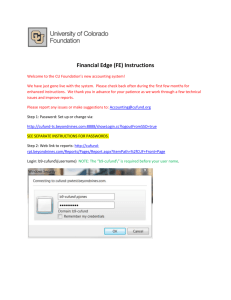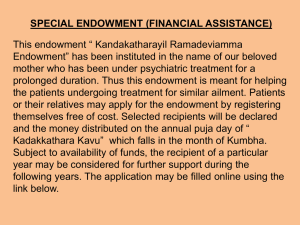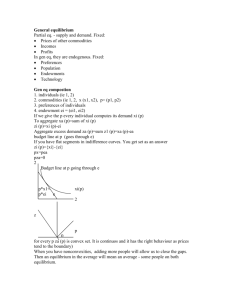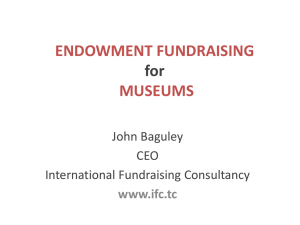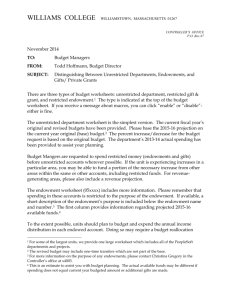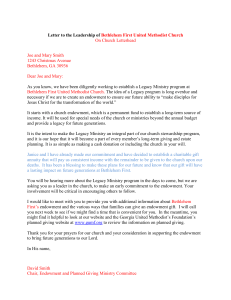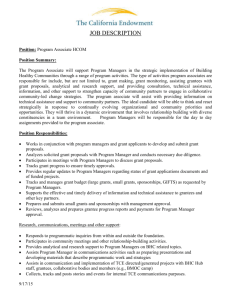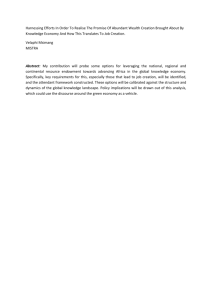Donor restricted funds consist of gifts to a charity that are subject to
advertisement
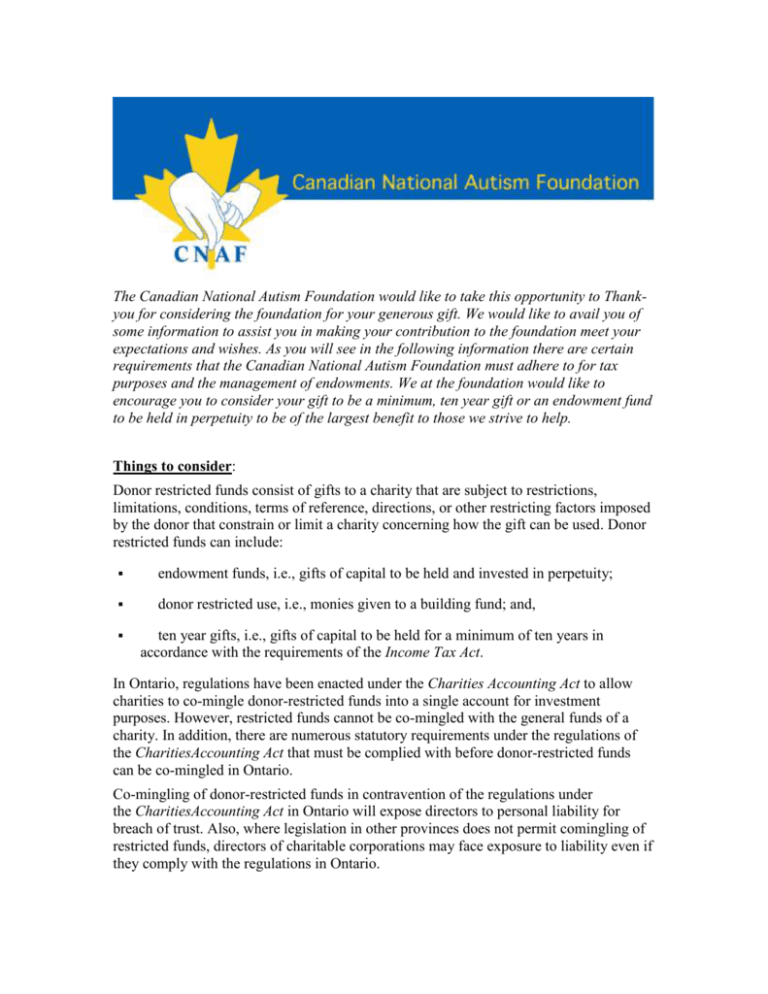
The Canadian National Autism Foundation would like to take this opportunity to Thankyou for considering the foundation for your generous gift. We would like to avail you of some information to assist you in making your contribution to the foundation meet your expectations and wishes. As you will see in the following information there are certain requirements that the Canadian National Autism Foundation must adhere to for tax purposes and the management of endowments. We at the foundation would like to encourage you to consider your gift to be a minimum, ten year gift or an endowment fund to be held in perpetuity to be of the largest benefit to those we strive to help. Things to consider: Donor restricted funds consist of gifts to a charity that are subject to restrictions, limitations, conditions, terms of reference, directions, or other restricting factors imposed by the donor that constrain or limit a charity concerning how the gift can be used. Donor restricted funds can include: endowment funds, i.e., gifts of capital to be held and invested in perpetuity; donor restricted use, i.e., monies given to a building fund; and, ten year gifts, i.e., gifts of capital to be held for a minimum of ten years in accordance with the requirements of the Income Tax Act. In Ontario, regulations have been enacted under the Charities Accounting Act to allow charities to co-mingle donor-restricted funds into a single account for investment purposes. However, restricted funds cannot be co-mingled with the general funds of a charity. In addition, there are numerous statutory requirements under the regulations of the CharitiesAccounting Act that must be complied with before donor-restricted funds can be co-mingled in Ontario. Co-mingling of donor-restricted funds in contravention of the regulations under the CharitiesAccounting Act in Ontario will expose directors to personal liability for breach of trust. Also, where legislation in other provinces does not permit comingling of restricted funds, directors of charitable corporations may face exposure to liability even if they comply with the regulations in Ontario. 2 Creation of Endowments An endowment is an investment fund set aside for the long-term support of a charity. The principal remains invested. Only the income, or a portion of the income, is spent. The income is used for purposes set by the donor or as the organization’s board decides. Endowments must be established with regard to the charitable disbursement requirements contained in section 149.1 of the Income Tax Act. As indicated earlier, all charities (including public and private foundations) must disburse for charitable purposes 80% of receipted donations received in the preceding year, excluding gifts received from an estate, gifts subject to the donor’s direction that they be held in trust for at least ten years and donated property accumulated upon written approval of the Federal Minister of National Revenue. Public and private foundations are subject to additional disbursement requirements. o o The effect is that a charity will not be subject to the 80% disbursement rule if: it receives a bequest, or the donor in a letter or in an endowment agreement stipulates that the donated property, or property substituted for it, be held for a period of at least 10 years. Most endowments are built through planned gifts, often through bequests and gifts made subject to a 10-year donor direction. Endowments commonly fall into the following categories: o General. Undesignated bequests, endowment contributions not designated for a named fund or specific program and memorial gifts are often placed in the charity’s general endowment. A donor may contribute any amount. o Institutional restricted. These endowments fund specific permanent ongoing programs. A donor may contribute any amount to the organization’s endowment targeted to a specific program or program area. o Named. These endowments are named for the donor, a loved one or a friend. They are usually created for specific purposes or to support specific programs, with a minimum initial contribution (often $10,000 or more) required to create the named endowment. 3 o Benefits to the donor A named endowment provides a form of immortality for you, preserving your name or the name of a loved one, and standing as a permanent expression of your values. You will receive a deep sense of satisfaction in setting up a fund that will last forever, has lasting significance for the charity and will outlive you. You will have left a permanent imprint that will have a lasting and ongoing impact. o You will receive an immediate donation receipt for all contributions made to endowment(s) during your lifetime. Your estate receives a donation receipt for an endowment established and funded through your will. o Endowments are ideal if you do not want to fund current needs, but rather wish your gift to be preserved and used long after you are gone, to assure a perpetual income stream that will support your area(s) of interest, create a lasting legacy and make a statement about what is important to you. o Subject to the charity’s mission and policies, you receive the satisfaction of being able to direct that endowment income be used to accomplish purposes important to you. Who can give? o o General endowments. Anyone with an interest in the organization and its future. Named endowments. Middle to upper-income donors with an interest in the charity and its future. Service clubs and associations may also find named endowments appealing. How is this done? Donors may establish endowments directly with an organization or may fund charitable work through an endowment established with a community foundation or other foundation. Many donors create an endowment while alive. The donor and the charity sign a simple endowment agreement describing the endowment, its purposes and how it will be funded. A donor may establish an endowment upon death by including appropriate language in his or her will. 4 Endowments may be funded in any of the following ways: o outright donation of cash or other assets, o gift in the donor’s will, o death benefits or cash surrender value of life insurance, o remainder interest of a Charitable Remainder Trust, o residual interest when the donor retains use of a principal residence or other property, o gift element of a gift annuity, o proceeds received when a strip bond matures, or o retirement funds designated for the charity. Important Considerations Endowment gifts are irrevocable. The donor cannot get the funds back. Endowment agreements and bequest language should provide for the possibility of changed circumstances in the future. Changing conditions and scientific/technological advances may make the original program funded by the endowment obsolete. The gift will have a more enduring long-term benefit if stated in general terms rather than being too narrowly restricted. An endowment to fund polio research would have been valuable in the past. But polio has been conquered in the developed world. An endowed fund for research into infectious diseases could address such current problems as AIDS. The charity through its policies may set minimum amounts required to create named endowments. A $10,000 minimum is the most common. Anything less becomes too expensive and administratively onerous to maintain. Some individuals may not be able to contribute $10,000 in one lump sum. Some charities will accept smaller contributions over a period of time (for example, up to five years) under an agreement to invest the contributions in a holding account until the minimum necessary amount is reached. If contributions do not reach the required minimum within the agreed period, no named fund is created and the contributions become part of the general, unrestricted endowment. Donors and advisors considering endowment gifts should satisfy themselves that the charity is well-managed and stable enough to operate over the long term. Think decades into the future. 5 When considering an endowment, check with the charity regarding its mission, endowment giving options and minimum requirements, endowment acceptance policies and procedures, and endowment investment policies. Planned gifts can provide beneficial results for a donor but, in order to ensure that all relevant issues have been considered and addressed and that all Income Tax Act, Canada provisions and regulations are met, prospective donors should seek qualified legal and accounting advice. Our full legal name is: Canadian National Autism Foundation (2000) Our federal charitable registration number is: 867189243 RR0001 Canadian National Autism Foundation mailing address 38 King Street East PO Box 66512, Stoney Creek, On L8G 5E5
